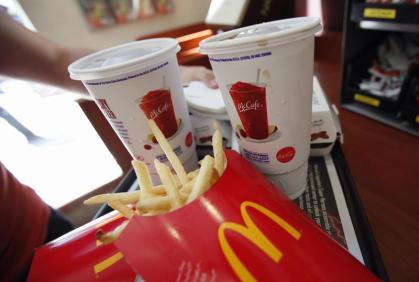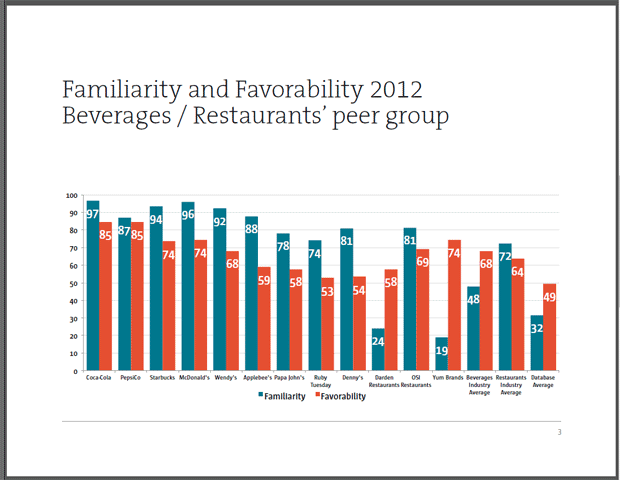Restaurant Ratings: McDonald’s, Starbucks Rank High With Execs
Among American restaurant chains, two markedly different names rank the highest in a survey of business executives: McDonald's (MCD) and Starbucks (SBUX).

Using data carved from a larger survey regarding the business community's mindset on well-known corporations, research firm CoreBrand said the best-perceived restaurant brands in combined favorability and familiarity scores are the Quarter Pounder seller and the coffee shop operator.
Recently released findings from CoreBrand ranked PepsiCo (PEP) and Coca-Cola (KO) as the most-respected brands in the opinion of survey respondents, who are director-level and above executives. When focusing only on the restaurant industry, McDonald's had the highest familiarity among the survey set, rating a 96 out of 100, followed by Starbucks, with a 94. They tied on the favorable side, with each earning a 74. Though Yum! Brands (YUM), known for its divisions KFC, Taco Bell and Pizza Hut, also got a 74 on favorability, it rated well below the group average on familiarity.
The purpose of the scores is to attempt to measure corporate intangibles in a manner akin to revenue and profits. Whereas those numbers easily can be determined and tracked over time, it's much harder to quantify how one is viewed. "The corporate brand consists of everything you say and do as a corporation," says CoreBrand CEO James Gregory.
Important to remember is that the survey isn't specifically about whether a given restaurant's food tastes good or is good for you, and it isn't based on the dining behavior of regular consumers or their general feelings toward a particular restaurant group. These are business people commenting primarily on the business attributes of a corporation and its executives to gauge its brand.
That said, it is conceivable that the ongoing debate surrounding the healthfulness, or lack thereof, at chain restaurants and the new battle over fast-food wages, should it become more prominent, presumably could start to affect some scores. If certain managers respond poorly to a future crisis or find themselves at odds with prevailing attitudes in the business community, the rankings theoretically could decline. For now though, the restaurants on the whole outperform the average results in CoreBrand's database of 1,000 companies, as seen on the right side of the chart (click the chart for a larger image).
Source: CoreBrand
In order to arrive at the scores, CoreBrand conducts telephone surveys asking participants how familiar they are with a group of companies. A score of 1 indicates the respondent doesn't know the company at all, and a 5 signifies extensive knowledge. After determining the companies they know best, participants are asked questions on reputation, what they think of the management and whether it's a sound investment. The results are then used to form the component scores and totals on a 0-100 scale.
For the two restaurants at the top, McDonald's edged out Starbucks in terms of reputation 81 to 80 and won on investment potential 78 to 67. However, for perception of management, Starbucks finished ahead 74 to 65.
In addition to the latest findings, Gregory's firm also follows the score trends over time, and they do change for some of the operators.
"[At] Starbucks, for example, there's been downward pressure on them since about 2007. So the favorability has been dropping," he says. "McDonald's has been holding very, very steady. Wendy's (WEN) also has some slight downward pressure, but is very stable."
Not surprisingly, companies whose restaurant name and corporate name are the same tend to have a big advantage in the survey. That works against the familiarity ranking of companies such as Darden Restaurants (DRI), the owner of Olive Garden and Red Lobster, and notably the aforementioned Yum! Brands. Yum does perform admirably on the favorable scale, yet it was hurt badly in the combined results by the familiarity ranking, where it scored only a 19.
"The business leaders who know them think very highly of them," Gregory says. "They're the highest overall reputation of all the restaurant chains." On that measure, Yum did beat both McDonald's and Starbucks, posting an 83. It also surpassed them on the perception of management question, with a 76, though it trailed the duo on investment potential, finishing at 64.
An outlier here was OSI, part of Bloomin' Brands (BLMN), the owner of Outback Steakhouse and Carrabba's Italian Grill. It scored high on the familiarity ranking, getting an 81.
Other notes Gregory pointed out from the survey:
DineEquity's (DIN) Applebee's has been improving brand familiarity, while favorability has been fairly steady.
Papa John's (PZZA) has also seen its level of familiarity grow, though favorability has been slightly declining.
Ruby Tuesday's (RT) favorability is rising, and familiarity is stable. In terms of investment potential, it's been improving.
Denny's (DENN), which landed on CoreBrand's least-respected brands list, has seen familiarity grow, but that's widened the gap between how well it's known and how it's perceived. Favorability has only been "trickling upward" for the company that calls itself America's Diner.

